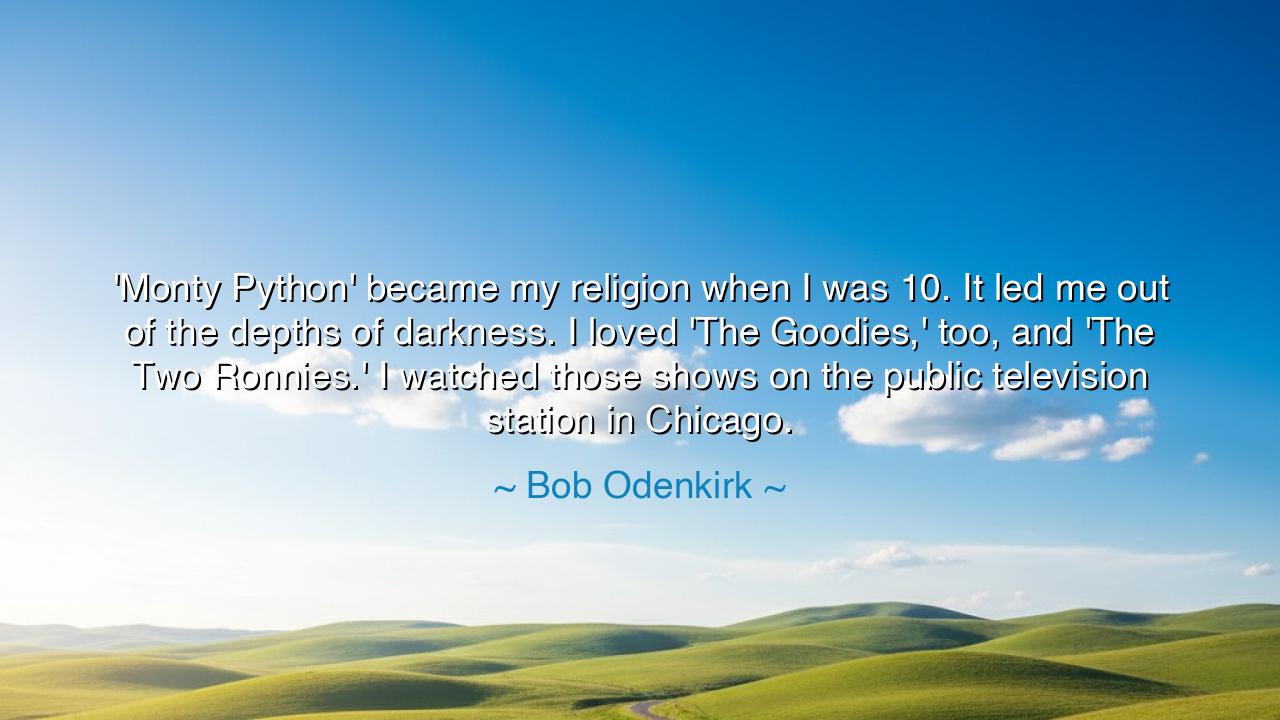
'Monty Python' became my religion when I was 10. It led me out of
'Monty Python' became my religion when I was 10. It led me out of the depths of darkness. I loved 'The Goodies,' too, and 'The Two Ronnies.' I watched those shows on the public television station in Chicago.






The words of Bob Odenkirk—“‘Monty Python’ became my religion when I was 10. It led me out of the depths of darkness. I loved ‘The Goodies,’ too, and ‘The Two Ronnies.’ I watched those shows on the public television station in Chicago.”—reveal a truth both profound and playful. Here, he does not speak of religion in the formal sense, but of something that took its place in the chambers of his heart when he needed it most: laughter, absurdity, and creativity as a balm for the soul. In this confession lies a wisdom that transcends comedy: that art, even when clothed in humor, can rescue us from despair and become a guiding light.
The origin of this quote lies in Odenkirk’s childhood, when he, like many, wrestled with the shadows of loneliness and the uncertainties of growing up. At that tender age, where meaning is sought and identity begins to form, he found not comfort in dogma, but in the joyous irreverence of British comedy. Shows like Monty Python, with their surreal wit and fearless ridicule of authority, did what sermons could not: they brought light where there was darkness, and gave the young boy courage to laugh in the face of life’s heaviness. To call it “religion” was not irony, but gratitude—his acknowledgment of a force that saved him.
This truth is not unique to Odenkirk. History is filled with examples where art—whether song, story, or humor—became salvation. During the Great Depression, Charlie Chaplin’s silent films offered more than entertainment; they gave the downtrodden courage to smile in the midst of hunger and uncertainty. In Nazi-occupied Europe, comedians and satirists risked their lives to mock tyranny, keeping alive the spirit of freedom through laughter. As Monty Python did for Odenkirk, these voices reminded humanity that even in darkness, the spark of joy could not be extinguished.
The heart of his words also speaks to the sacred role of imagination. Religion, in its truest sense, is that which gives meaning, comfort, and guidance to the soul. For Odenkirk, this meaning came not from scripture, but from absurd sketches of knights, philosophers, and dead parrots. And yet, was it any less sacred? For what is sacred, if not that which saves a soul from despair and inspires it to live? In this way, Monty Python became not only his comedy, but his catechism, teaching him to see the world askew, to question the solemnity of power, and to find freedom in laughter.
There is also in this reflection a hidden heroism: the courage to admit that salvation can be found in unexpected places. Odenkirk does not pretend that his “religion” was traditional; he names it honestly and joyfully. By doing so, he reminds us that each soul finds its nourishment in different forms, and that the divine may reveal itself through comedy as surely as through ritual. The lesson is not that religion is unnecessary, but that meaning can be born wherever the human spirit encounters truth, laughter, and light.
The lesson for us is simple yet profound: do not despise the sources of joy that lift your soul, no matter how unorthodox they may seem. For some, the hymns of a church bring peace; for others, the sketches of Monty Python or the stories of The Two Ronnies offer the same solace. What matters is not the form, but the fruit: does it bring you out of darkness? Does it give you courage to face life? Does it make you more alive? If so, then honor it as sacred.
Practically, this means allowing ourselves to embrace art, comedy, and creativity not as mere distractions, but as nourishment. Watch, read, or listen to what makes you laugh deeply, for laughter itself is a prayer against despair. Share humor with others, for in doing so you build community and light the burden of existence. And above all, never forget—as Odenkirk discovered—that joy is not frivolous, but essential, a lamp to guide us through shadow.
Thus, his words stand not only as a memory of childhood but as a testament: laughter can be religion, comedy can be salvation, and imagination can be a path to light. Like a holy scripture of absurdity, Monty Python taught him to survive, to create, and to live. Let us remember, then, that even the silliest joke can carry the weight of hope, and that sometimes the greatest wisdom is hidden in laughter.






AAdministratorAdministrator
Welcome, honored guests. Please leave a comment, we will respond soon